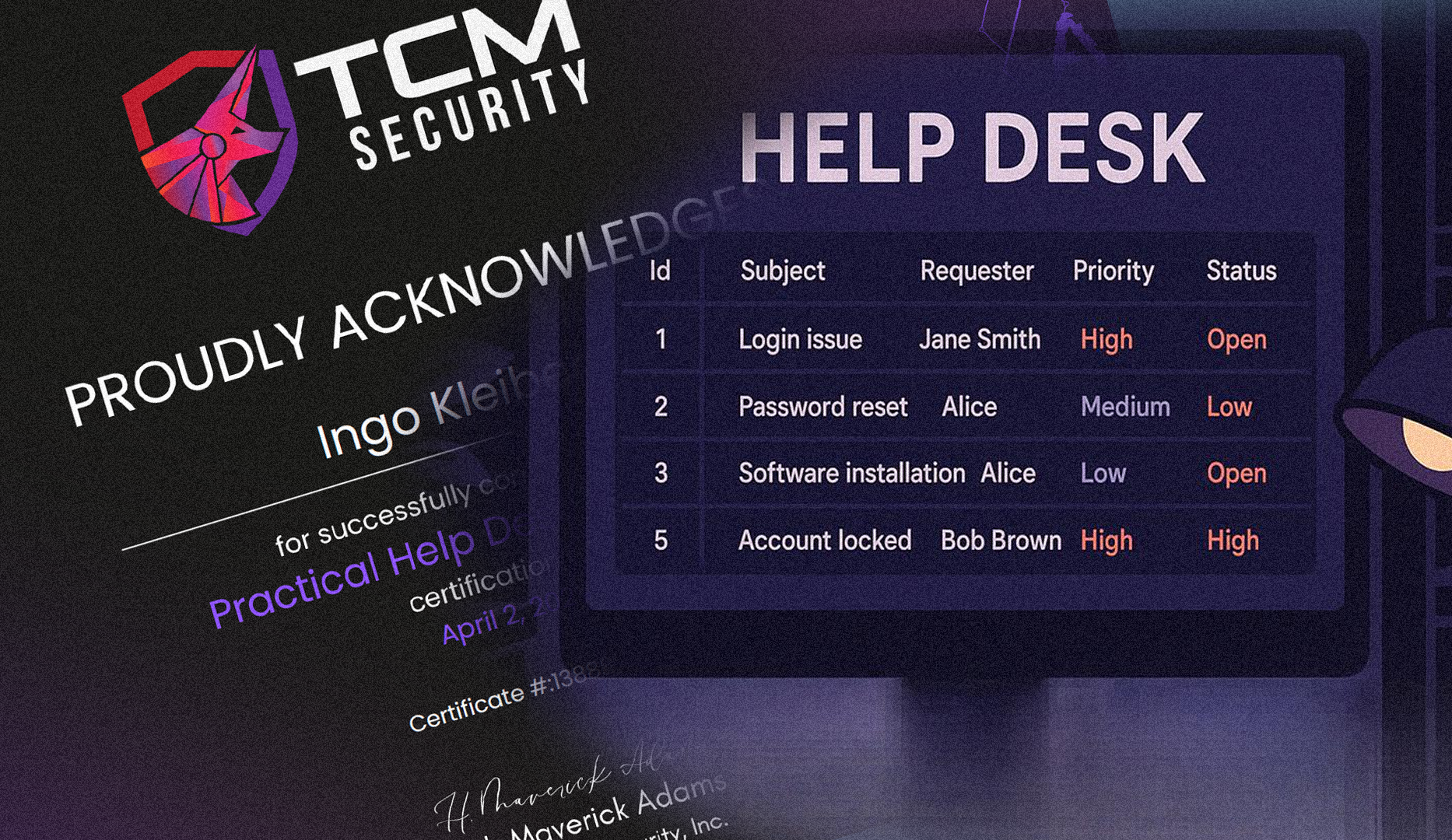Short Review: TCM Security's Practical Help Desk Associate (PHDA)

Working as a help desk supporter is one of the most common routes into more advanced IT or cyber roles. Especially given that these are usually entry-level positions, the pathway into a help desk job is not always clear-cut. That said, about a month ago, TCM Security released their new Practical Help Desk Associate Certification (PHDA), which tests the competencies taught in their free Practical Help Desk course.
Based on my previous experiences with TCM Security’s approach – I currently hold the PNPT and the PORP – I wanted to have a look at this certification that, at first, seems out of place for a security-focused education provider.
I have taken the course and the exam out of pure curiosity and specifically not based on my own educational or career-oriented needs. However, having gone through them, they also serve a purpose for more experienced learners. For example, as someone who works with help desks, this experience has led me to rethink some of the processes and tools we use and made me think about the competencies needed by great supporters.
However, let’s step back for a moment. According to TCM, the PHDA is “a beginner-level exam that will prepare students for a career on the IT help desk. The exam requires students to resolve support tickets and create Knowledge Base documentation”. From a knowledge and skills perspective, both the course and the exam cover a wide range of topics. They include, for example, Windows and Linux administration, hardware troubleshooting, networking, security, and, very importantly, (remote) support strategies and ticketing.
From a positioning perspective, the PHDA most likely competes with certifications like CompTIA’s A+ and Google’s IT Support Certificates. However, especially compared to the very popular A+, the PHDA is extremely hands-on on and learners basically go through a day of help desk work, as described above, actually solving issues and documenting them on live systems.
The Practical Help Desk Course
TCM Security offers their Practical Help Desk Course, which is the foundational course for the PHDA, for free in their academy. The course covers, as hinted to above, a wide range of topics. The course covers organizational fundamentals such as typical roles in an IT department, a wide array of technical topics (e.g., Hardware, Windows (including AD), Linux, Networking, Security, and Virtualization), as well as fundamentals of providing (remote) support and using ticketing systems.
At first, I was unsure about the selection of topics, as the technical ones seemed somewhat random to me. While I would still have loved to see (or understand) how the topics have been chosen – e.g., following a competency framework – I believe the course makes a lot of sense. The course introduces learners to a wide variety of technical topics and covers many areas that one would assume to come up in a typical IT help desk context. Ultimately, I would say that learners who finished the course and did the practical exercises themselves have a very good grasp of many IT fundamentals. That said, the learning curve, especially for actual beginners, is quite steep, and topics such as containerization, bash scripting or subnetting might be challenging, especially given the breadth of topics covered.
Content-wise, the only thing I would have liked to see is a more structured approach to IT Service Management and support in general. While the course does a great job of introducing help desk activities in a hands-on matter, I do believe that some theory, e.g., regarding established frameworks and standards, would benefit the learners.
From a Learning Experience Design perspective, the course is straightforward and works very well. It essentially is composed of engaging video lectures, some text-based sections, hands-on examples and exercises (to be done on virtual machines), and so-called “Ticket Interrupts.” These interrupts and example tickets that learners can solve; afterward, Andrew Bellini, who teaches the course, runs through his steps of solving the issue. From an assessment point of view, there are formative “Check-In Quizzes” after each section that allow learners to test their knowledge.
Overall, especially given that the course is free, I absolutely recommend it for those interested in a broad introduction to IT topics. That said, even if you already are competent with regard to the technical topics, the sections on providing remote support and using ticketing systems are definitely very interesting and worth your time!
Practical Help Desk Associate Certification Exam
I cannot go into too much detail about the exam itself for obvious reasons. Nevertheless, I want to point out why that is a very good exam that works as a learning experience on its own.
The PHDA exam offers an incredibly authentic assessment. Learners are thrown into a live environment (via Apache Guacamole) comprised of various machines. The exam takes up to eight hours – a full work day – and learners, within that environment, act as a help desk technician. You are given various tickets, work on them, and write documentation. It is straightforward but incredibly hands-on and authentic.
I found the exam to be extremely fair, given the course content. It is definitely challenging for beginners, but at no time did it feel unfair. Also, based on my experience with actual help desks, the tasks on the exam, while obviously designed for an exam situation, mirror real life quite well and allow learners to demonstrate all competencies required for a help desk position. The eight-hour timeframe is also very fair. I did not rush the exam and finished in about four and a half hours.
Ultimately, also given that the rather complex exam environment worked flawlessly, the 199$ price tag is more than fair. Being provided a free retake opportunity also clearly demonstrates TCM Security’s approach, where they “never want to profit on failure.” Honestly, Kudos!
Of course, as in my previous interactions with TCM, the support team also did a fantastic job. I took the exam on the weekend and, at some point, was not sure about the exam environment behaving correctly. Within minutes of my email, support reached out to me and resolved my issue.
Conclusion – Is It Worth It?
Of course, the worth of a certification can be measured in various ways. Looking at it from a learning angle, as I said, is definitely worth it. The exam in itself, even without the certification associated with it, is a very valuable and hands-on learning experience. Being able to do the job, albeit simulated, is great!
Whether the market will recognize the certification is still undecided. However, having gone through it, I would and will trust a candidate holding the certification to have great foundations. Knowing that someone has demonstrated some technical competencies, not just knowledge, can work a ticketing system, and understands how to write documentation is a fantastic start!
Ps. While it is a bit odd that this certification is part of TCM Security’s portfolio, to me, it clearly fits with their mission of enabling learners. While the PHDA is not security-related per se, it fits nicely into an educational offering that also truly considers career paths and takes a more holistic approach, including offerings such as the very cool, and also free, “Soft Skills for the Job Market” course.

Thank you for visiting!
I hope, you are enjoying the article! I'd love to get in touch! 😀
Follow me on LinkedIn